Taxation Law Assignment: Income Tax Calculation for Sarah (2017/18)
VerifiedAdded on 2023/04/25
|10
|2233
|475
Homework Assignment
AI Summary
This assignment analyzes Sarah's tax liabilities for the 2017/18 income year, focusing on her income from employment and teaching, and her eligibility for various deductions. The solution examines the application of relevant sections of the ITAA 1997, including those related to assessable income, home office expenses, depreciation, membership fees, travel expenses, and self-education expenses. The assignment assesses whether Sarah can claim deductions for expenses such as home office costs, design equipment, and travel to client premises, while also considering the tax implications of selling personal assets. The solution includes a detailed computation of Sarah's taxable income and net tax payable, incorporating relevant case law and tax rulings to support the analysis. The assignment concludes with a summary of the findings, outlining Sarah's tax obligations and the deductions she is entitled to claim.
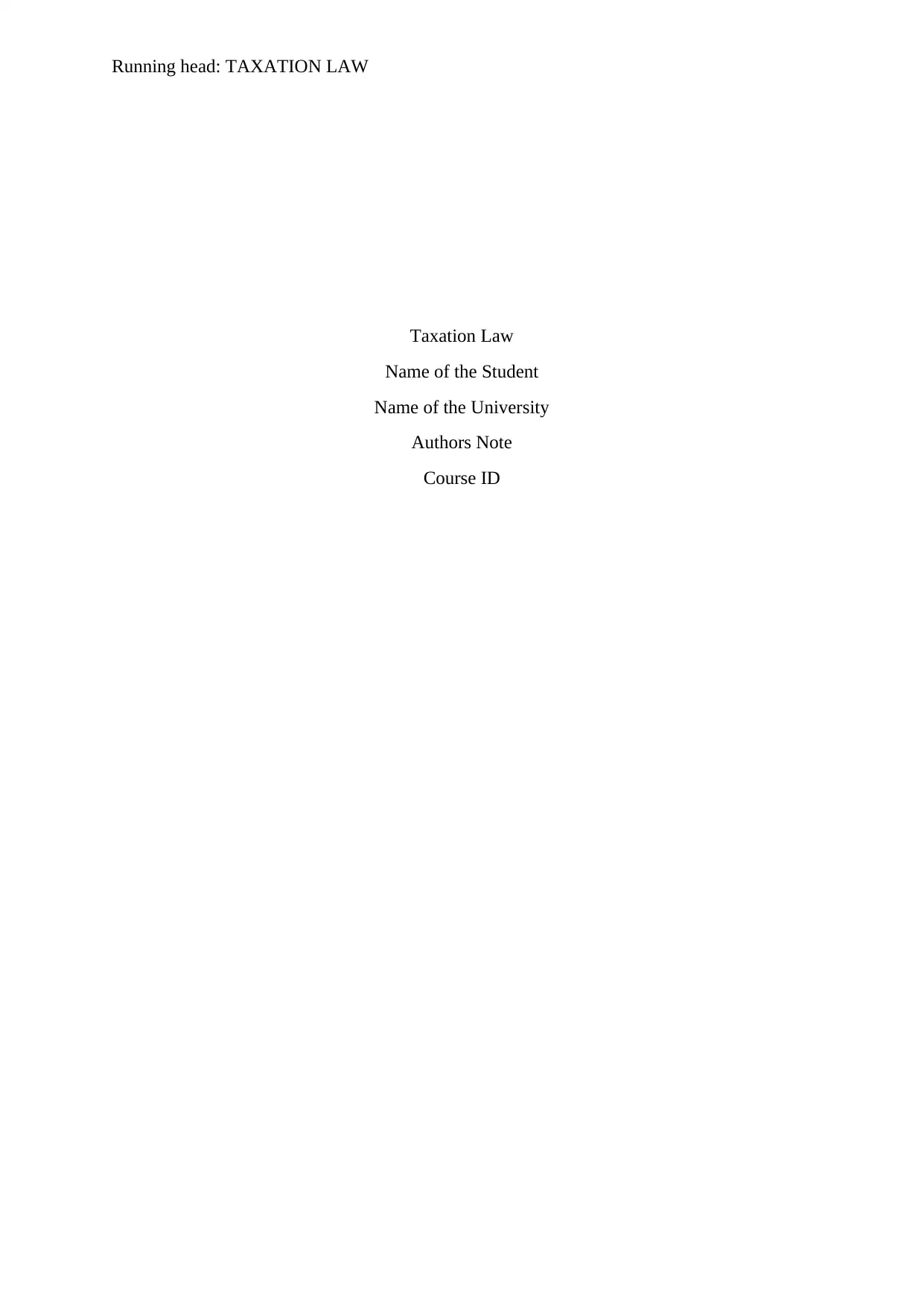
Running head: TAXATION LAW
Taxation Law
Name of the Student
Name of the University
Authors Note
Course ID
Taxation Law
Name of the Student
Name of the University
Authors Note
Course ID
Paraphrase This Document
Need a fresh take? Get an instant paraphrase of this document with our AI Paraphraser
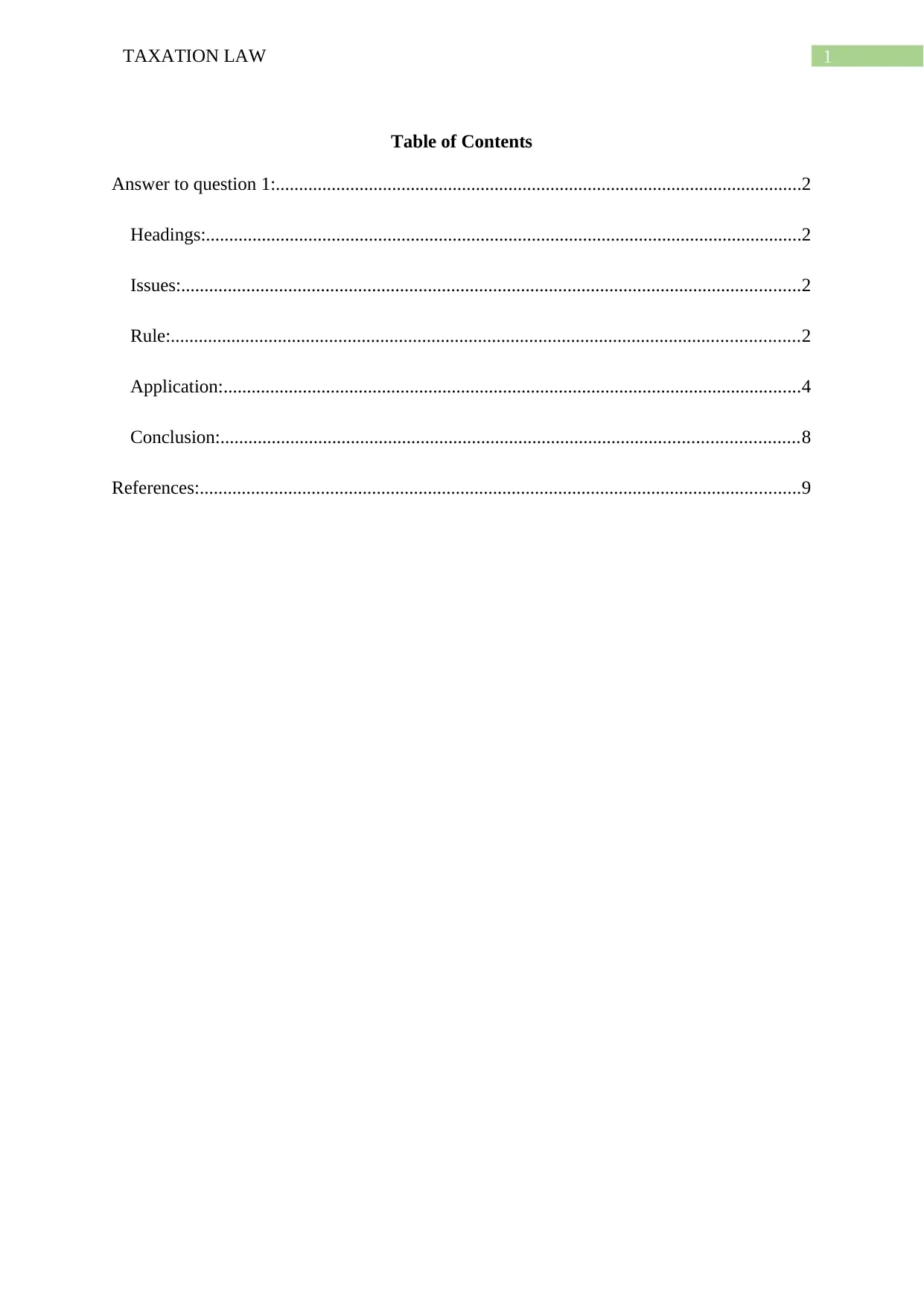
1TAXATION LAW
Table of Contents
Answer to question 1:.................................................................................................................2
Headings:................................................................................................................................2
Issues:.....................................................................................................................................2
Rule:.......................................................................................................................................2
Application:............................................................................................................................4
Conclusion:............................................................................................................................8
References:.................................................................................................................................9
Table of Contents
Answer to question 1:.................................................................................................................2
Headings:................................................................................................................................2
Issues:.....................................................................................................................................2
Rule:.......................................................................................................................................2
Application:............................................................................................................................4
Conclusion:............................................................................................................................8
References:.................................................................................................................................9
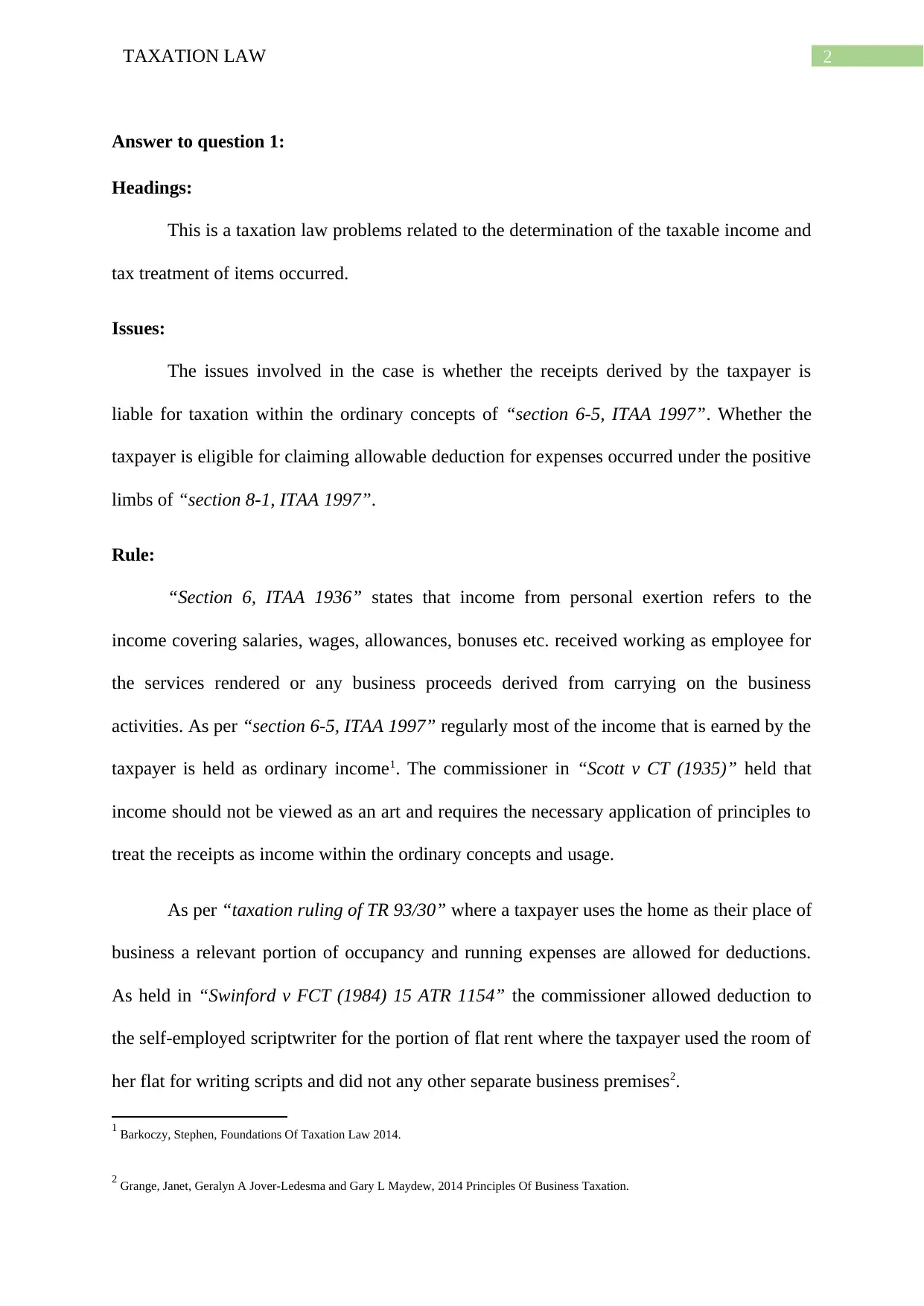
2TAXATION LAW
Answer to question 1:
Headings:
This is a taxation law problems related to the determination of the taxable income and
tax treatment of items occurred.
Issues:
The issues involved in the case is whether the receipts derived by the taxpayer is
liable for taxation within the ordinary concepts of “section 6-5, ITAA 1997”. Whether the
taxpayer is eligible for claiming allowable deduction for expenses occurred under the positive
limbs of “section 8-1, ITAA 1997”.
Rule:
“Section 6, ITAA 1936” states that income from personal exertion refers to the
income covering salaries, wages, allowances, bonuses etc. received working as employee for
the services rendered or any business proceeds derived from carrying on the business
activities. As per “section 6-5, ITAA 1997” regularly most of the income that is earned by the
taxpayer is held as ordinary income1. The commissioner in “Scott v CT (1935)” held that
income should not be viewed as an art and requires the necessary application of principles to
treat the receipts as income within the ordinary concepts and usage.
As per “taxation ruling of TR 93/30” where a taxpayer uses the home as their place of
business a relevant portion of occupancy and running expenses are allowed for deductions.
As held in “Swinford v FCT (1984) 15 ATR 1154” the commissioner allowed deduction to
the self-employed scriptwriter for the portion of flat rent where the taxpayer used the room of
her flat for writing scripts and did not any other separate business premises2.
1 Barkoczy, Stephen, Foundations Of Taxation Law 2014.
2 Grange, Janet, Geralyn A Jover-Ledesma and Gary L Maydew, 2014 Principles Of Business Taxation.
Answer to question 1:
Headings:
This is a taxation law problems related to the determination of the taxable income and
tax treatment of items occurred.
Issues:
The issues involved in the case is whether the receipts derived by the taxpayer is
liable for taxation within the ordinary concepts of “section 6-5, ITAA 1997”. Whether the
taxpayer is eligible for claiming allowable deduction for expenses occurred under the positive
limbs of “section 8-1, ITAA 1997”.
Rule:
“Section 6, ITAA 1936” states that income from personal exertion refers to the
income covering salaries, wages, allowances, bonuses etc. received working as employee for
the services rendered or any business proceeds derived from carrying on the business
activities. As per “section 6-5, ITAA 1997” regularly most of the income that is earned by the
taxpayer is held as ordinary income1. The commissioner in “Scott v CT (1935)” held that
income should not be viewed as an art and requires the necessary application of principles to
treat the receipts as income within the ordinary concepts and usage.
As per “taxation ruling of TR 93/30” where a taxpayer uses the home as their place of
business a relevant portion of occupancy and running expenses are allowed for deductions.
As held in “Swinford v FCT (1984) 15 ATR 1154” the commissioner allowed deduction to
the self-employed scriptwriter for the portion of flat rent where the taxpayer used the room of
her flat for writing scripts and did not any other separate business premises2.
1 Barkoczy, Stephen, Foundations Of Taxation Law 2014.
2 Grange, Janet, Geralyn A Jover-Ledesma and Gary L Maydew, 2014 Principles Of Business Taxation.
⊘ This is a preview!⊘
Do you want full access?
Subscribe today to unlock all pages.

Trusted by 1+ million students worldwide
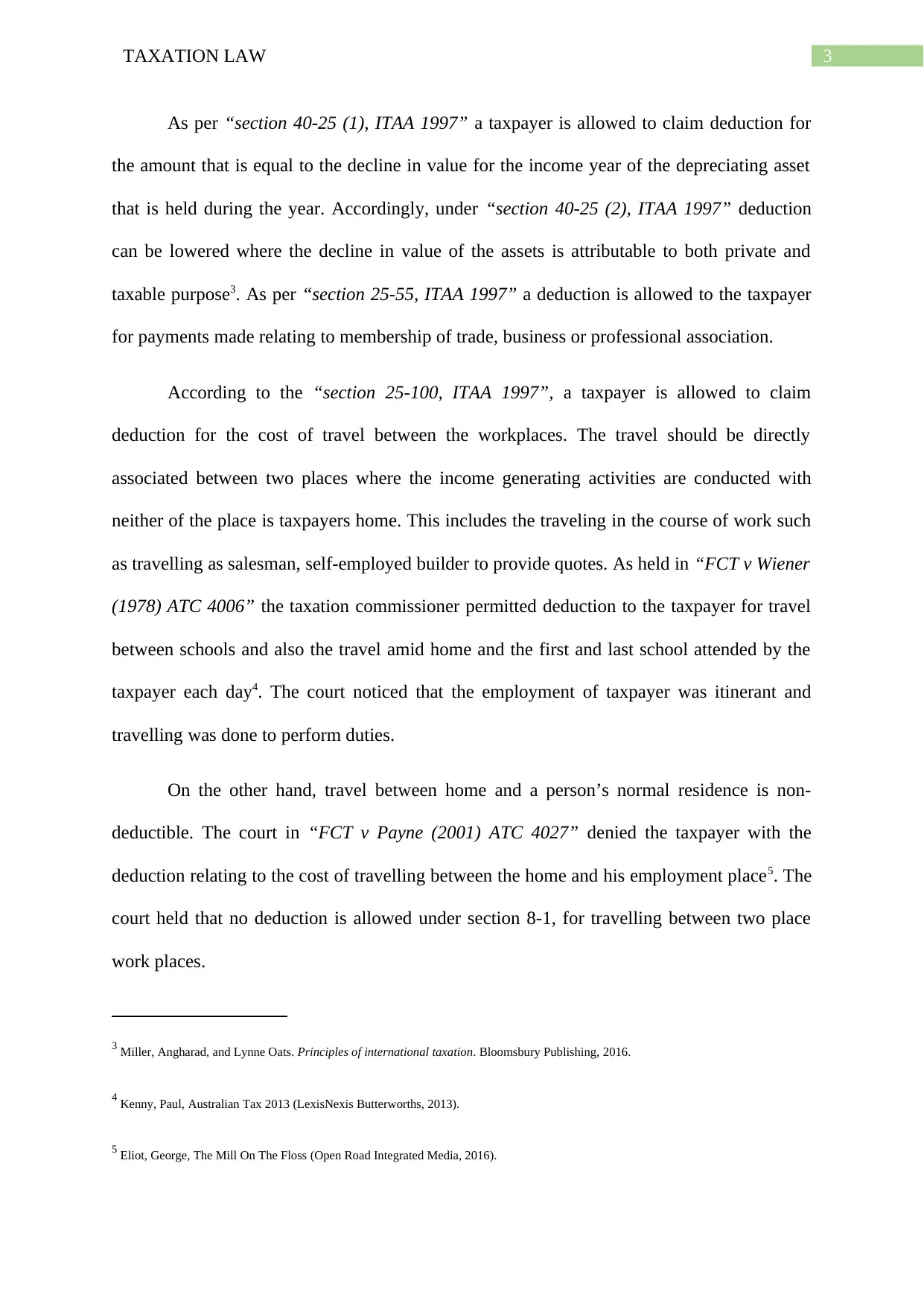
3TAXATION LAW
As per “section 40-25 (1), ITAA 1997” a taxpayer is allowed to claim deduction for
the amount that is equal to the decline in value for the income year of the depreciating asset
that is held during the year. Accordingly, under “section 40-25 (2), ITAA 1997” deduction
can be lowered where the decline in value of the assets is attributable to both private and
taxable purpose3. As per “section 25-55, ITAA 1997” a deduction is allowed to the taxpayer
for payments made relating to membership of trade, business or professional association.
According to the “section 25-100, ITAA 1997”, a taxpayer is allowed to claim
deduction for the cost of travel between the workplaces. The travel should be directly
associated between two places where the income generating activities are conducted with
neither of the place is taxpayers home. This includes the traveling in the course of work such
as travelling as salesman, self-employed builder to provide quotes. As held in “FCT v Wiener
(1978) ATC 4006” the taxation commissioner permitted deduction to the taxpayer for travel
between schools and also the travel amid home and the first and last school attended by the
taxpayer each day4. The court noticed that the employment of taxpayer was itinerant and
travelling was done to perform duties.
On the other hand, travel between home and a person’s normal residence is non-
deductible. The court in “FCT v Payne (2001) ATC 4027” denied the taxpayer with the
deduction relating to the cost of travelling between the home and his employment place5. The
court held that no deduction is allowed under section 8-1, for travelling between two place
work places.
3 Miller, Angharad, and Lynne Oats. Principles of international taxation. Bloomsbury Publishing, 2016.
4 Kenny, Paul, Australian Tax 2013 (LexisNexis Butterworths, 2013).
5 Eliot, George, The Mill On The Floss (Open Road Integrated Media, 2016).
As per “section 40-25 (1), ITAA 1997” a taxpayer is allowed to claim deduction for
the amount that is equal to the decline in value for the income year of the depreciating asset
that is held during the year. Accordingly, under “section 40-25 (2), ITAA 1997” deduction
can be lowered where the decline in value of the assets is attributable to both private and
taxable purpose3. As per “section 25-55, ITAA 1997” a deduction is allowed to the taxpayer
for payments made relating to membership of trade, business or professional association.
According to the “section 25-100, ITAA 1997”, a taxpayer is allowed to claim
deduction for the cost of travel between the workplaces. The travel should be directly
associated between two places where the income generating activities are conducted with
neither of the place is taxpayers home. This includes the traveling in the course of work such
as travelling as salesman, self-employed builder to provide quotes. As held in “FCT v Wiener
(1978) ATC 4006” the taxation commissioner permitted deduction to the taxpayer for travel
between schools and also the travel amid home and the first and last school attended by the
taxpayer each day4. The court noticed that the employment of taxpayer was itinerant and
travelling was done to perform duties.
On the other hand, travel between home and a person’s normal residence is non-
deductible. The court in “FCT v Payne (2001) ATC 4027” denied the taxpayer with the
deduction relating to the cost of travelling between the home and his employment place5. The
court held that no deduction is allowed under section 8-1, for travelling between two place
work places.
3 Miller, Angharad, and Lynne Oats. Principles of international taxation. Bloomsbury Publishing, 2016.
4 Kenny, Paul, Australian Tax 2013 (LexisNexis Butterworths, 2013).
5 Eliot, George, The Mill On The Floss (Open Road Integrated Media, 2016).
Paraphrase This Document
Need a fresh take? Get an instant paraphrase of this document with our AI Paraphraser
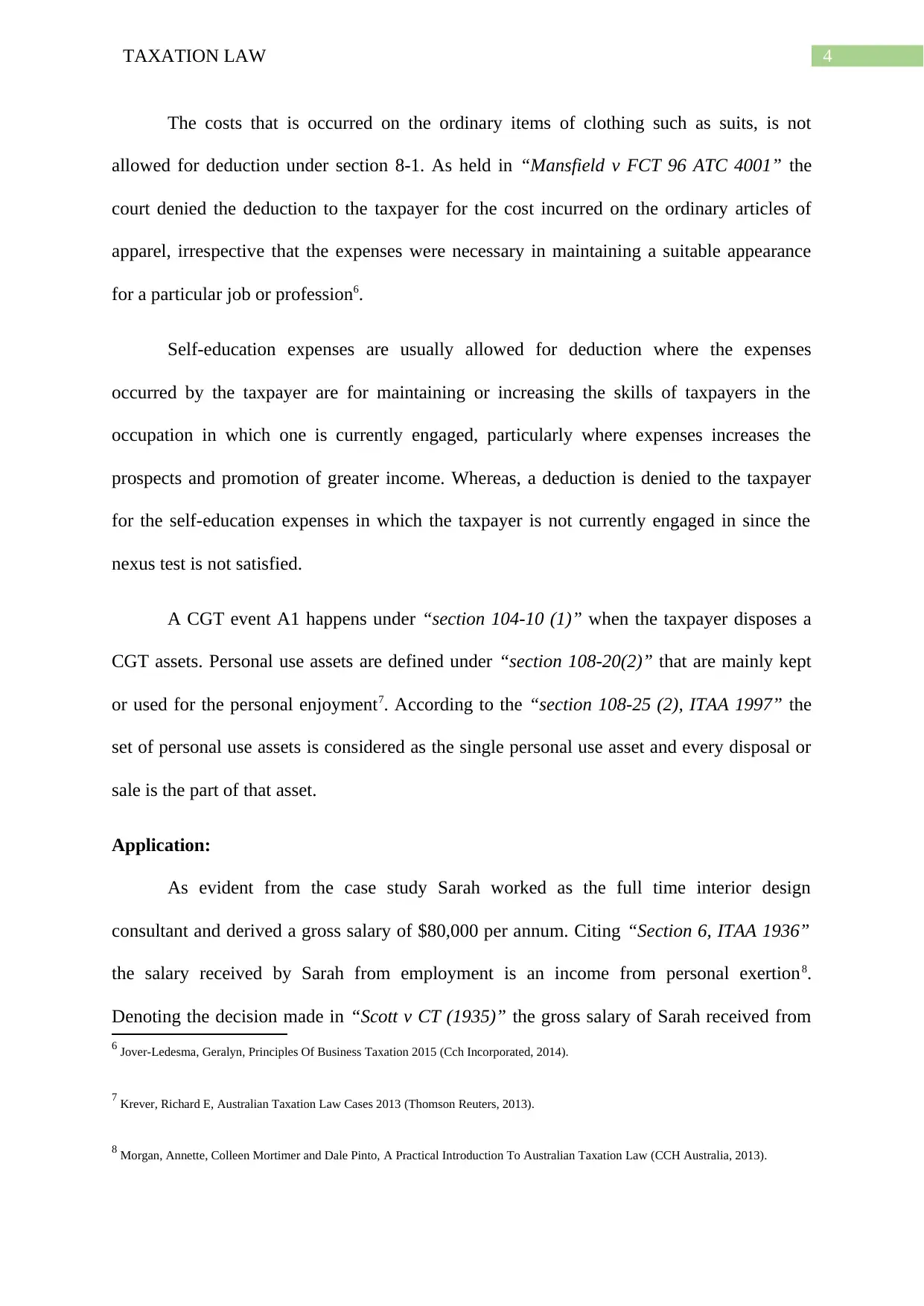
4TAXATION LAW
The costs that is occurred on the ordinary items of clothing such as suits, is not
allowed for deduction under section 8-1. As held in “Mansfield v FCT 96 ATC 4001” the
court denied the deduction to the taxpayer for the cost incurred on the ordinary articles of
apparel, irrespective that the expenses were necessary in maintaining a suitable appearance
for a particular job or profession6.
Self-education expenses are usually allowed for deduction where the expenses
occurred by the taxpayer are for maintaining or increasing the skills of taxpayers in the
occupation in which one is currently engaged, particularly where expenses increases the
prospects and promotion of greater income. Whereas, a deduction is denied to the taxpayer
for the self-education expenses in which the taxpayer is not currently engaged in since the
nexus test is not satisfied.
A CGT event A1 happens under “section 104-10 (1)” when the taxpayer disposes a
CGT assets. Personal use assets are defined under “section 108-20(2)” that are mainly kept
or used for the personal enjoyment7. According to the “section 108-25 (2), ITAA 1997” the
set of personal use assets is considered as the single personal use asset and every disposal or
sale is the part of that asset.
Application:
As evident from the case study Sarah worked as the full time interior design
consultant and derived a gross salary of $80,000 per annum. Citing “Section 6, ITAA 1936”
the salary received by Sarah from employment is an income from personal exertion8.
Denoting the decision made in “Scott v CT (1935)” the gross salary of Sarah received from
6 Jover-Ledesma, Geralyn, Principles Of Business Taxation 2015 (Cch Incorporated, 2014).
7 Krever, Richard E, Australian Taxation Law Cases 2013 (Thomson Reuters, 2013).
8 Morgan, Annette, Colleen Mortimer and Dale Pinto, A Practical Introduction To Australian Taxation Law (CCH Australia, 2013).
The costs that is occurred on the ordinary items of clothing such as suits, is not
allowed for deduction under section 8-1. As held in “Mansfield v FCT 96 ATC 4001” the
court denied the deduction to the taxpayer for the cost incurred on the ordinary articles of
apparel, irrespective that the expenses were necessary in maintaining a suitable appearance
for a particular job or profession6.
Self-education expenses are usually allowed for deduction where the expenses
occurred by the taxpayer are for maintaining or increasing the skills of taxpayers in the
occupation in which one is currently engaged, particularly where expenses increases the
prospects and promotion of greater income. Whereas, a deduction is denied to the taxpayer
for the self-education expenses in which the taxpayer is not currently engaged in since the
nexus test is not satisfied.
A CGT event A1 happens under “section 104-10 (1)” when the taxpayer disposes a
CGT assets. Personal use assets are defined under “section 108-20(2)” that are mainly kept
or used for the personal enjoyment7. According to the “section 108-25 (2), ITAA 1997” the
set of personal use assets is considered as the single personal use asset and every disposal or
sale is the part of that asset.
Application:
As evident from the case study Sarah worked as the full time interior design
consultant and derived a gross salary of $80,000 per annum. Citing “Section 6, ITAA 1936”
the salary received by Sarah from employment is an income from personal exertion8.
Denoting the decision made in “Scott v CT (1935)” the gross salary of Sarah received from
6 Jover-Ledesma, Geralyn, Principles Of Business Taxation 2015 (Cch Incorporated, 2014).
7 Krever, Richard E, Australian Taxation Law Cases 2013 (Thomson Reuters, 2013).
8 Morgan, Annette, Colleen Mortimer and Dale Pinto, A Practical Introduction To Australian Taxation Law (CCH Australia, 2013).
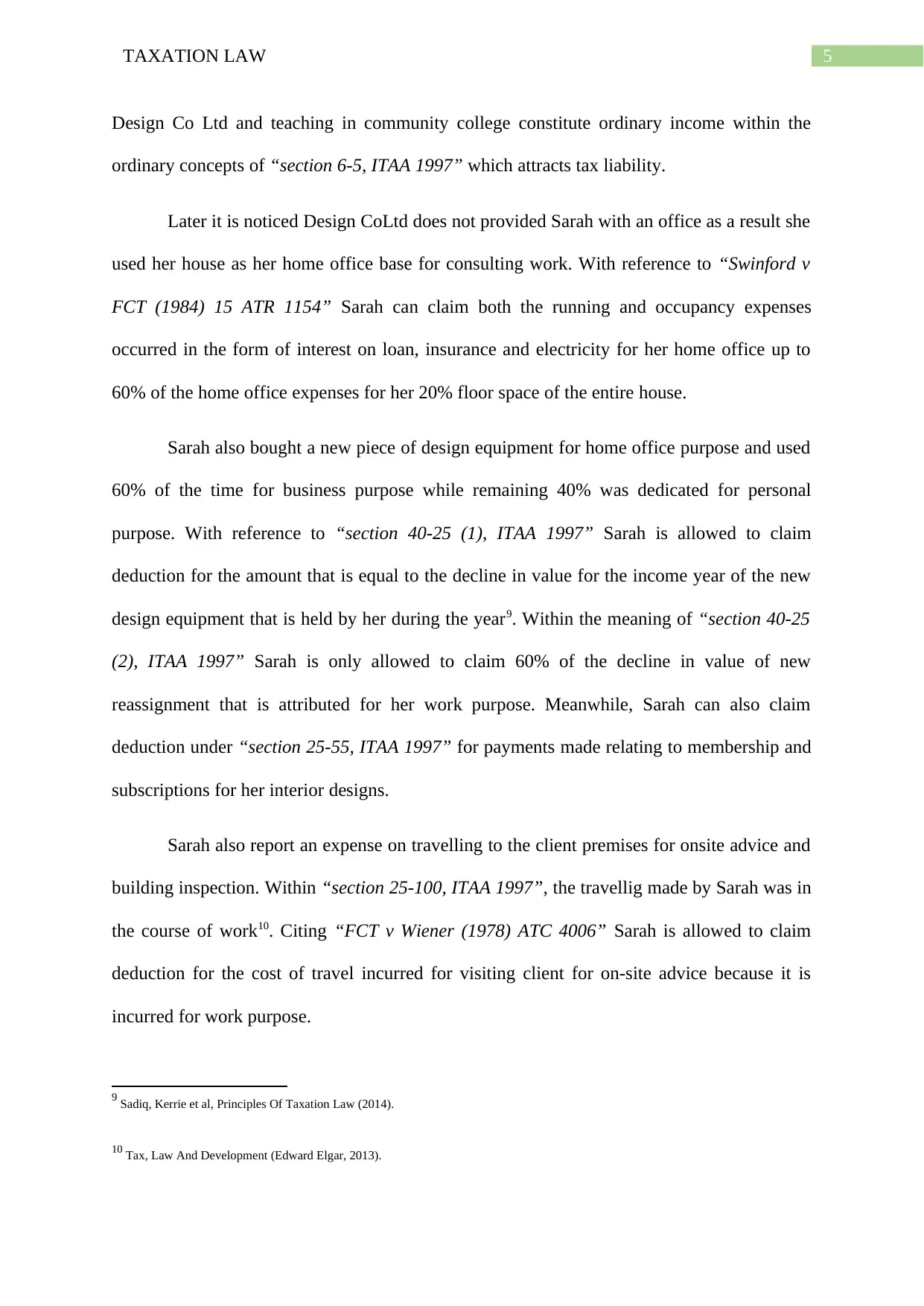
5TAXATION LAW
Design Co Ltd and teaching in community college constitute ordinary income within the
ordinary concepts of “section 6-5, ITAA 1997” which attracts tax liability.
Later it is noticed Design CoLtd does not provided Sarah with an office as a result she
used her house as her home office base for consulting work. With reference to “Swinford v
FCT (1984) 15 ATR 1154” Sarah can claim both the running and occupancy expenses
occurred in the form of interest on loan, insurance and electricity for her home office up to
60% of the home office expenses for her 20% floor space of the entire house.
Sarah also bought a new piece of design equipment for home office purpose and used
60% of the time for business purpose while remaining 40% was dedicated for personal
purpose. With reference to “section 40-25 (1), ITAA 1997” Sarah is allowed to claim
deduction for the amount that is equal to the decline in value for the income year of the new
design equipment that is held by her during the year9. Within the meaning of “section 40-25
(2), ITAA 1997” Sarah is only allowed to claim 60% of the decline in value of new
reassignment that is attributed for her work purpose. Meanwhile, Sarah can also claim
deduction under “section 25-55, ITAA 1997” for payments made relating to membership and
subscriptions for her interior designs.
Sarah also report an expense on travelling to the client premises for onsite advice and
building inspection. Within “section 25-100, ITAA 1997”, the travellig made by Sarah was in
the course of work10. Citing “FCT v Wiener (1978) ATC 4006” Sarah is allowed to claim
deduction for the cost of travel incurred for visiting client for on-site advice because it is
incurred for work purpose.
9 Sadiq, Kerrie et al, Principles Of Taxation Law (2014).
10 Tax, Law And Development (Edward Elgar, 2013).
Design Co Ltd and teaching in community college constitute ordinary income within the
ordinary concepts of “section 6-5, ITAA 1997” which attracts tax liability.
Later it is noticed Design CoLtd does not provided Sarah with an office as a result she
used her house as her home office base for consulting work. With reference to “Swinford v
FCT (1984) 15 ATR 1154” Sarah can claim both the running and occupancy expenses
occurred in the form of interest on loan, insurance and electricity for her home office up to
60% of the home office expenses for her 20% floor space of the entire house.
Sarah also bought a new piece of design equipment for home office purpose and used
60% of the time for business purpose while remaining 40% was dedicated for personal
purpose. With reference to “section 40-25 (1), ITAA 1997” Sarah is allowed to claim
deduction for the amount that is equal to the decline in value for the income year of the new
design equipment that is held by her during the year9. Within the meaning of “section 40-25
(2), ITAA 1997” Sarah is only allowed to claim 60% of the decline in value of new
reassignment that is attributed for her work purpose. Meanwhile, Sarah can also claim
deduction under “section 25-55, ITAA 1997” for payments made relating to membership and
subscriptions for her interior designs.
Sarah also report an expense on travelling to the client premises for onsite advice and
building inspection. Within “section 25-100, ITAA 1997”, the travellig made by Sarah was in
the course of work10. Citing “FCT v Wiener (1978) ATC 4006” Sarah is allowed to claim
deduction for the cost of travel incurred for visiting client for on-site advice because it is
incurred for work purpose.
9 Sadiq, Kerrie et al, Principles Of Taxation Law (2014).
10 Tax, Law And Development (Edward Elgar, 2013).
⊘ This is a preview!⊘
Do you want full access?
Subscribe today to unlock all pages.

Trusted by 1+ million students worldwide
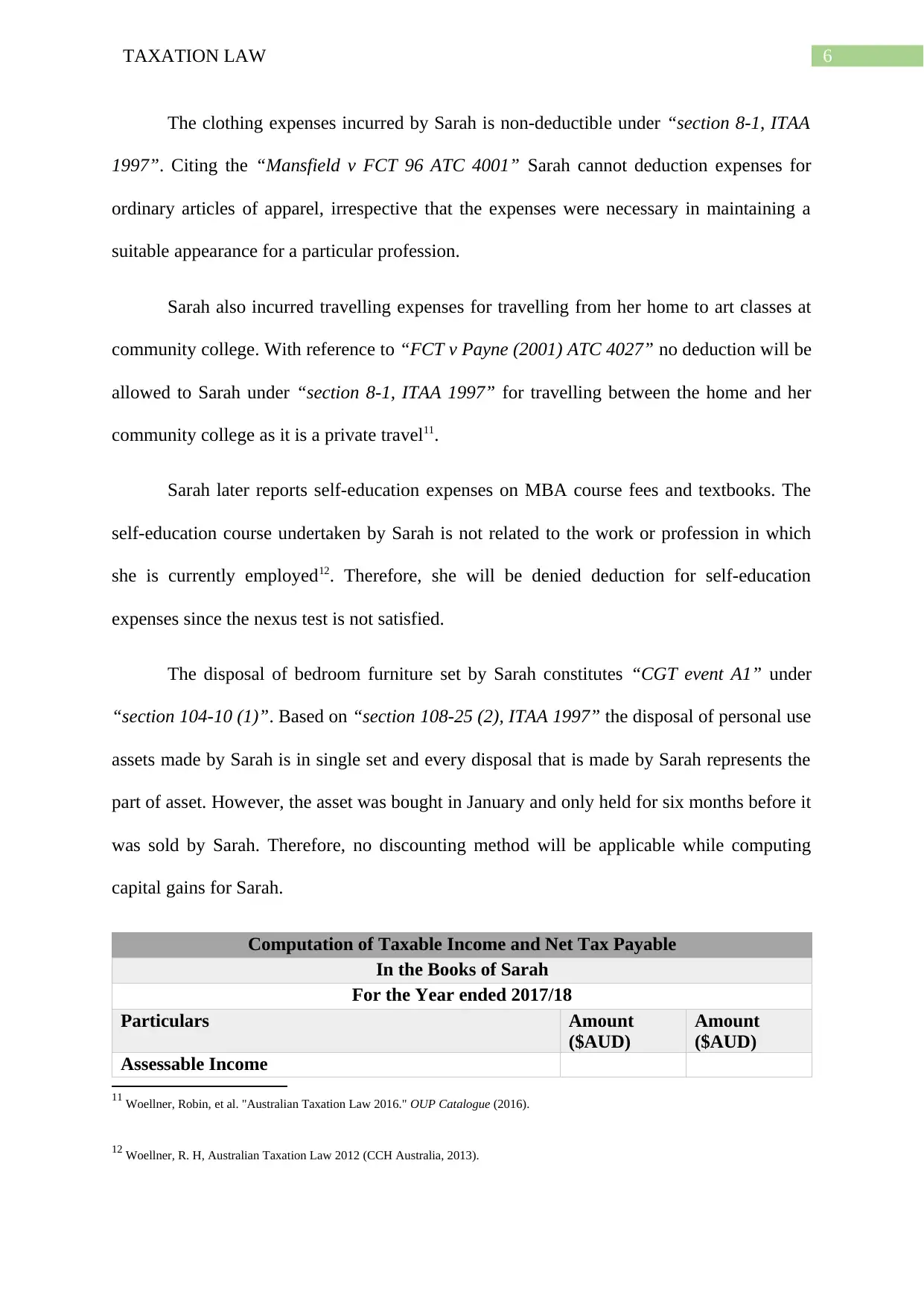
6TAXATION LAW
The clothing expenses incurred by Sarah is non-deductible under “section 8-1, ITAA
1997”. Citing the “Mansfield v FCT 96 ATC 4001” Sarah cannot deduction expenses for
ordinary articles of apparel, irrespective that the expenses were necessary in maintaining a
suitable appearance for a particular profession.
Sarah also incurred travelling expenses for travelling from her home to art classes at
community college. With reference to “FCT v Payne (2001) ATC 4027” no deduction will be
allowed to Sarah under “section 8-1, ITAA 1997” for travelling between the home and her
community college as it is a private travel11.
Sarah later reports self-education expenses on MBA course fees and textbooks. The
self-education course undertaken by Sarah is not related to the work or profession in which
she is currently employed12. Therefore, she will be denied deduction for self-education
expenses since the nexus test is not satisfied.
The disposal of bedroom furniture set by Sarah constitutes “CGT event A1” under
“section 104-10 (1)”. Based on “section 108-25 (2), ITAA 1997” the disposal of personal use
assets made by Sarah is in single set and every disposal that is made by Sarah represents the
part of asset. However, the asset was bought in January and only held for six months before it
was sold by Sarah. Therefore, no discounting method will be applicable while computing
capital gains for Sarah.
Computation of Taxable Income and Net Tax Payable
In the Books of Sarah
For the Year ended 2017/18
Particulars Amount
($AUD)
Amount
($AUD)
Assessable Income
11 Woellner, Robin, et al. "Australian Taxation Law 2016." OUP Catalogue (2016).
12 Woellner, R. H, Australian Taxation Law 2012 (CCH Australia, 2013).
The clothing expenses incurred by Sarah is non-deductible under “section 8-1, ITAA
1997”. Citing the “Mansfield v FCT 96 ATC 4001” Sarah cannot deduction expenses for
ordinary articles of apparel, irrespective that the expenses were necessary in maintaining a
suitable appearance for a particular profession.
Sarah also incurred travelling expenses for travelling from her home to art classes at
community college. With reference to “FCT v Payne (2001) ATC 4027” no deduction will be
allowed to Sarah under “section 8-1, ITAA 1997” for travelling between the home and her
community college as it is a private travel11.
Sarah later reports self-education expenses on MBA course fees and textbooks. The
self-education course undertaken by Sarah is not related to the work or profession in which
she is currently employed12. Therefore, she will be denied deduction for self-education
expenses since the nexus test is not satisfied.
The disposal of bedroom furniture set by Sarah constitutes “CGT event A1” under
“section 104-10 (1)”. Based on “section 108-25 (2), ITAA 1997” the disposal of personal use
assets made by Sarah is in single set and every disposal that is made by Sarah represents the
part of asset. However, the asset was bought in January and only held for six months before it
was sold by Sarah. Therefore, no discounting method will be applicable while computing
capital gains for Sarah.
Computation of Taxable Income and Net Tax Payable
In the Books of Sarah
For the Year ended 2017/18
Particulars Amount
($AUD)
Amount
($AUD)
Assessable Income
11 Woellner, Robin, et al. "Australian Taxation Law 2016." OUP Catalogue (2016).
12 Woellner, R. H, Australian Taxation Law 2012 (CCH Australia, 2013).
Paraphrase This Document
Need a fresh take? Get an instant paraphrase of this document with our AI Paraphraser
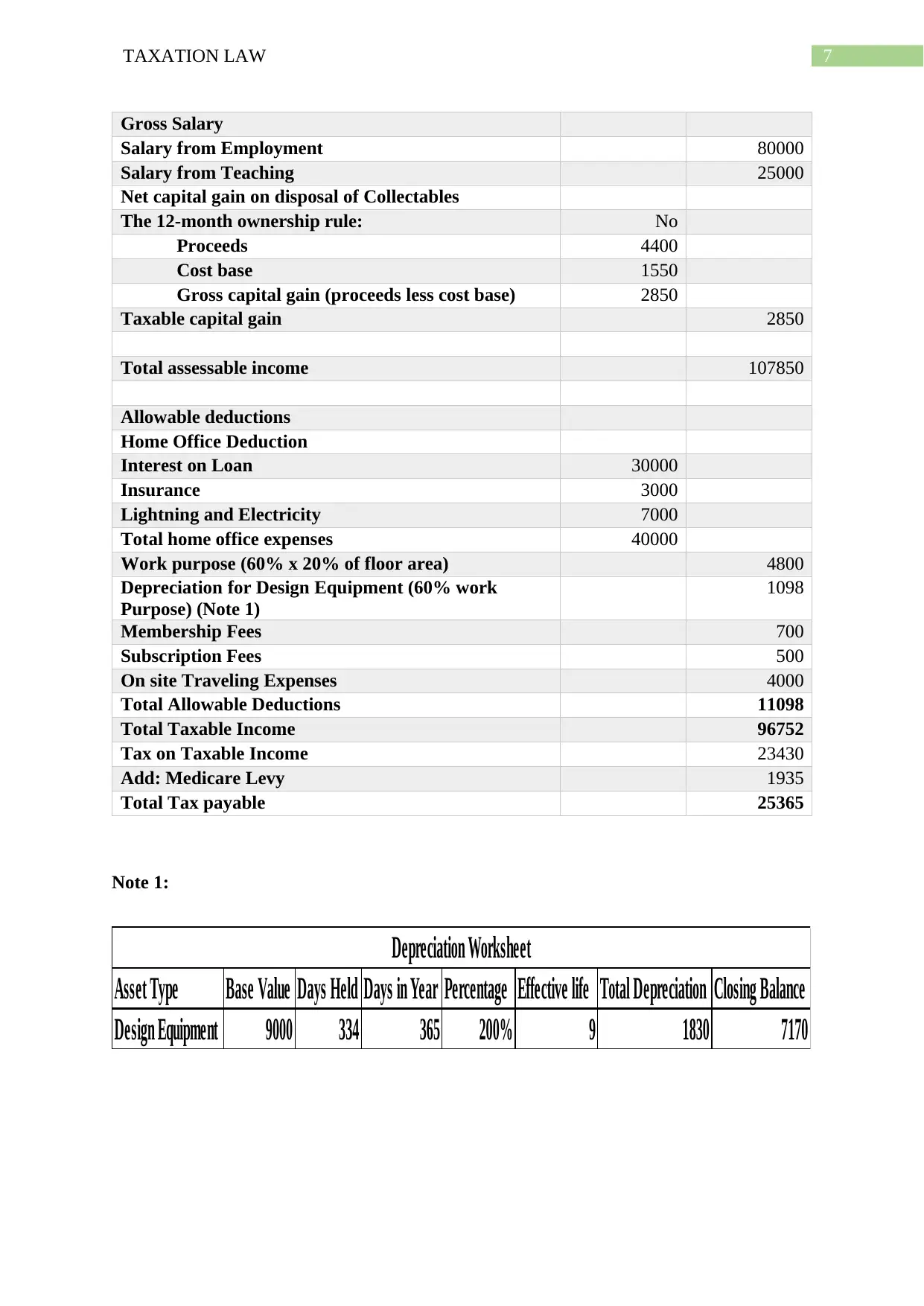
7TAXATION LAW
Gross Salary
Salary from Employment 80000
Salary from Teaching 25000
Net capital gain on disposal of Collectables
The 12-month ownership rule: No
Proceeds 4400
Cost base 1550
Gross capital gain (proceeds less cost base) 2850
Taxable capital gain 2850
Total assessable income 107850
Allowable deductions
Home Office Deduction
Interest on Loan 30000
Insurance 3000
Lightning and Electricity 7000
Total home office expenses 40000
Work purpose (60% x 20% of floor area) 4800
Depreciation for Design Equipment (60% work
Purpose) (Note 1)
1098
Membership Fees 700
Subscription Fees 500
On site Traveling Expenses 4000
Total Allowable Deductions 11098
Total Taxable Income 96752
Tax on Taxable Income 23430
Add: Medicare Levy 1935
Total Tax payable 25365
Note 1:
Asset Type Base Value Days Held Days in Year Percentage Effective life Total Depreciation Closing Balance
Design Equipment 9000 334 365 200% 9 1830 7170
Depreciation Worksheet
Gross Salary
Salary from Employment 80000
Salary from Teaching 25000
Net capital gain on disposal of Collectables
The 12-month ownership rule: No
Proceeds 4400
Cost base 1550
Gross capital gain (proceeds less cost base) 2850
Taxable capital gain 2850
Total assessable income 107850
Allowable deductions
Home Office Deduction
Interest on Loan 30000
Insurance 3000
Lightning and Electricity 7000
Total home office expenses 40000
Work purpose (60% x 20% of floor area) 4800
Depreciation for Design Equipment (60% work
Purpose) (Note 1)
1098
Membership Fees 700
Subscription Fees 500
On site Traveling Expenses 4000
Total Allowable Deductions 11098
Total Taxable Income 96752
Tax on Taxable Income 23430
Add: Medicare Levy 1935
Total Tax payable 25365
Note 1:
Asset Type Base Value Days Held Days in Year Percentage Effective life Total Depreciation Closing Balance
Design Equipment 9000 334 365 200% 9 1830 7170
Depreciation Worksheet
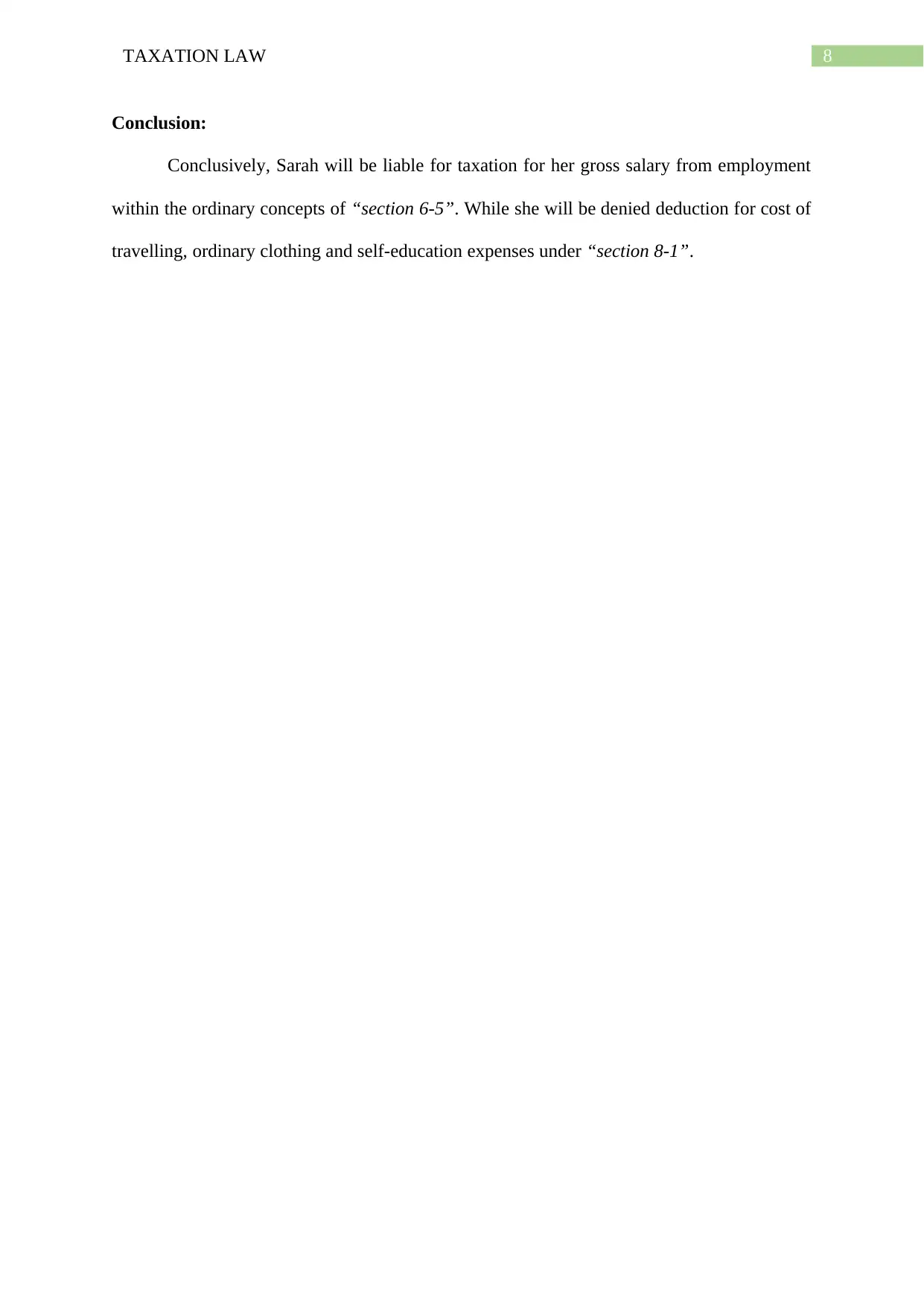
8TAXATION LAW
Conclusion:
Conclusively, Sarah will be liable for taxation for her gross salary from employment
within the ordinary concepts of “section 6-5”. While she will be denied deduction for cost of
travelling, ordinary clothing and self-education expenses under “section 8-1”.
Conclusion:
Conclusively, Sarah will be liable for taxation for her gross salary from employment
within the ordinary concepts of “section 6-5”. While she will be denied deduction for cost of
travelling, ordinary clothing and self-education expenses under “section 8-1”.
⊘ This is a preview!⊘
Do you want full access?
Subscribe today to unlock all pages.

Trusted by 1+ million students worldwide
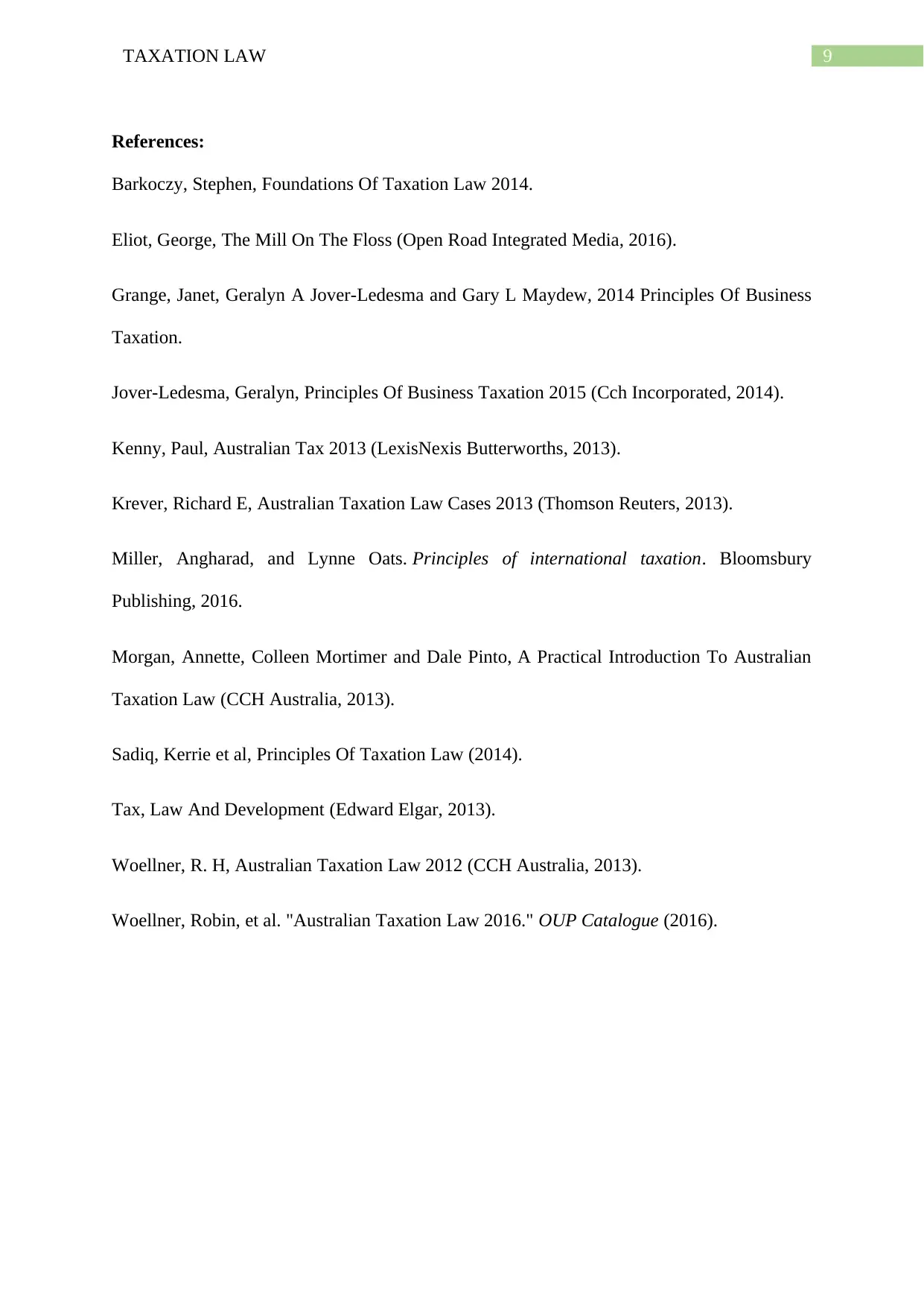
9TAXATION LAW
References:
Barkoczy, Stephen, Foundations Of Taxation Law 2014.
Eliot, George, The Mill On The Floss (Open Road Integrated Media, 2016).
Grange, Janet, Geralyn A Jover-Ledesma and Gary L Maydew, 2014 Principles Of Business
Taxation.
Jover-Ledesma, Geralyn, Principles Of Business Taxation 2015 (Cch Incorporated, 2014).
Kenny, Paul, Australian Tax 2013 (LexisNexis Butterworths, 2013).
Krever, Richard E, Australian Taxation Law Cases 2013 (Thomson Reuters, 2013).
Miller, Angharad, and Lynne Oats. Principles of international taxation. Bloomsbury
Publishing, 2016.
Morgan, Annette, Colleen Mortimer and Dale Pinto, A Practical Introduction To Australian
Taxation Law (CCH Australia, 2013).
Sadiq, Kerrie et al, Principles Of Taxation Law (2014).
Tax, Law And Development (Edward Elgar, 2013).
Woellner, R. H, Australian Taxation Law 2012 (CCH Australia, 2013).
Woellner, Robin, et al. "Australian Taxation Law 2016." OUP Catalogue (2016).
References:
Barkoczy, Stephen, Foundations Of Taxation Law 2014.
Eliot, George, The Mill On The Floss (Open Road Integrated Media, 2016).
Grange, Janet, Geralyn A Jover-Ledesma and Gary L Maydew, 2014 Principles Of Business
Taxation.
Jover-Ledesma, Geralyn, Principles Of Business Taxation 2015 (Cch Incorporated, 2014).
Kenny, Paul, Australian Tax 2013 (LexisNexis Butterworths, 2013).
Krever, Richard E, Australian Taxation Law Cases 2013 (Thomson Reuters, 2013).
Miller, Angharad, and Lynne Oats. Principles of international taxation. Bloomsbury
Publishing, 2016.
Morgan, Annette, Colleen Mortimer and Dale Pinto, A Practical Introduction To Australian
Taxation Law (CCH Australia, 2013).
Sadiq, Kerrie et al, Principles Of Taxation Law (2014).
Tax, Law And Development (Edward Elgar, 2013).
Woellner, R. H, Australian Taxation Law 2012 (CCH Australia, 2013).
Woellner, Robin, et al. "Australian Taxation Law 2016." OUP Catalogue (2016).
1 out of 10
Related Documents
Your All-in-One AI-Powered Toolkit for Academic Success.
+13062052269
info@desklib.com
Available 24*7 on WhatsApp / Email
![[object Object]](/_next/static/media/star-bottom.7253800d.svg)
Unlock your academic potential
Copyright © 2020–2026 A2Z Services. All Rights Reserved. Developed and managed by ZUCOL.





